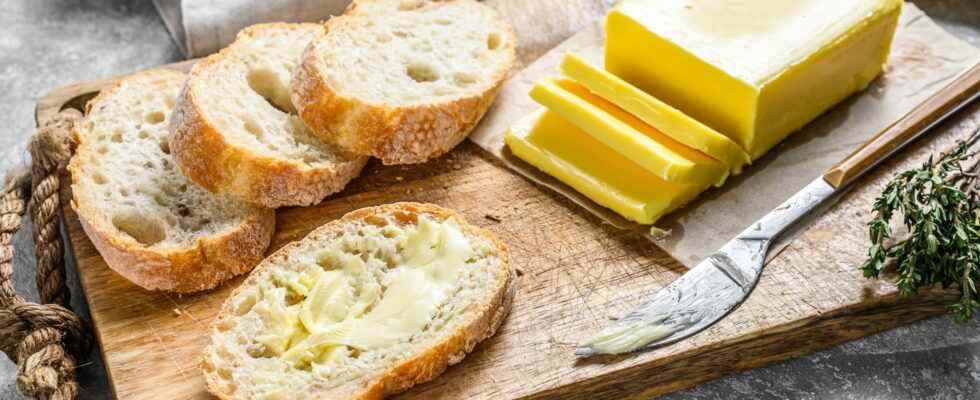Sweet, semi-salted, on toast or in our dishes, butter is one of the ingredients that is difficult to do without. But is it allowed during pregnancy? What are the precautions to take? Answers and advice from Alexia Karako, naturopath specializing in perinatal care.
If everyone knows that butter is a fatty product to be consumed in moderation, many questions surround this food when it comes to taking it during pregnancy. Is it raw or cooked, is it sterilized or, as legend has it, is it good for the future baby? Here are all the precautions to take before making good sandwiches!
Is the butter pasteurized?
Butter consumption during pregnancy is safe, provided it is pasteurized and not raw.
Butter is a 100% natural dairy product made from cow’s milk cream. This is made up of fat, water, casein, lactose and mineral salts. There are different types of butter depending on the treatment the cream has received: raw butter, churned butter, extra-fine butter and fine butter. Consuming butter during pregnancy is safe, provided it is pasteurized and not raw. This feature is on the packaging. However, it must be limited in the event ofLactose intolerancegestational diabetes and obesity. “Butter is rich in vitamin A, which contributes to the good cognitive and physical development of the fetus, as well as to its visual acuity. Preferably, we choose organic butter, fresh and not too salty in order to limit the risk of Water retention and high blood pressure”explains Alexia Karako.
Butter consumption: what are the risks of listeriosis and toxoplasmosis?
The risk of contracting listeriosis or toxoplasmosis by consuming pasteurized butter is very rare. Consumption of pasteurized butter during pregnancy is safe. However, you should avoid raw butter, ensure the freshness of the product and clean your fridge regularly.
Pregnant, should you prefer butter or margarine?
ANSES advises against the consumption of margarine by pregnant or breastfeeding women
Pregnant, it is better to prefer butter to margarine. In an opinion, ANSES advises against the consumption of margarine by pregnant or breastfeeding women. Indeed, margarine is enriched with phytosterols and stanols, compounds that aim to reduce cholesterol levels in the blood. Problem, they pass into the mother’s milk and the blood of infants, inducing a drop in the concentration of β-carotene (precursor of vitamin A). The naturopath also recommends GHEE butter that can be found in organic stores or that you can make yourself.. It is a clarified butter, that is to say which has been relieved of its water, lactose and animal proteins, which makes it much more digestible.
Pregnant, can I eat a white butter sauce?
” The answer is yes ! As long as the milk used is pasteurized, there is no problem. As for alcohol, it is only present in tiny quantities in the white butter sauce so don’t worry. “, reassures our interlocutor.
What is the ideal breakfast during pregnancy?
Breakfast is an essential meal, even more so during pregnancy because it contributes to the mother’s health and the healthy development of her baby. Ideally, it should consist of a dairy product, a cereal product and a fruit. In case of lactose intolerance, milk can be replaced by a vegetable drink. For sweet tooths, the naturopath recommends a smoothie with seasonal fruits and superfood toppings such as goji berries, chia seeds or almonds. Or an oatmeal porridge concocted with vegetable milk (almond, oats, coconut rice, etc.) on which we add hazelnuts, goji berries, raspberries or a very ripe banana. As for salted beaks, it is interesting to start the day with a breakfast with a glycemic index low. For example, half an avocado and/or a soft-boiled or fried egg, taking care to preserve the runny yolk and well-cooked white, all accompanied by wholemeal, integral or flower bread, with mashed potatoes. almond or peanut butter.
Does consuming butter during pregnancy promote the baby’s intelligence?
The consumption of butter during pregnancy does not affect the intelligence of the fetus.
On the other hand, Omega 3 fatty acids, found mainly in oily fish (tuna, salmon, sardines, herring, mackerel) and certain vegetable oils (nuts, rapeseed, flax), play an essential role in the development of the fetus. Indeed, they participate in the transport of glucose in the brain and in the formation of neurons. They are therefore essential for baby’s nervous system, psychomotor development and vision.
